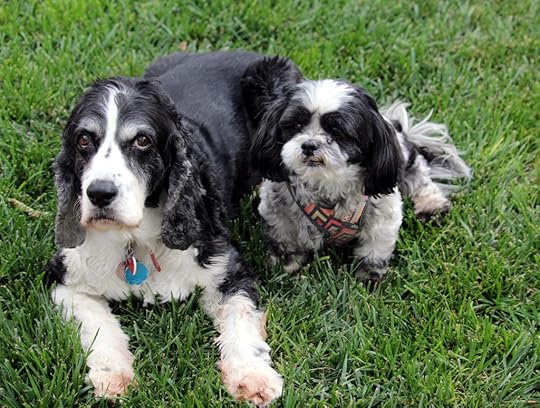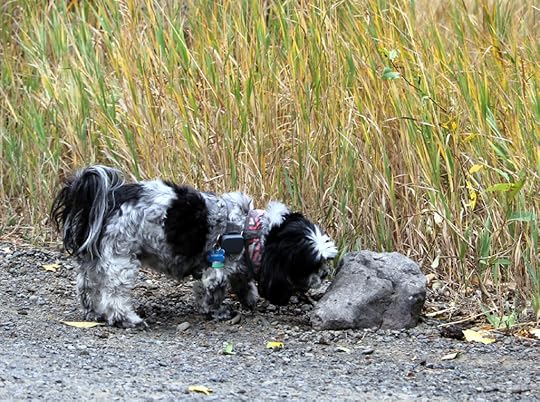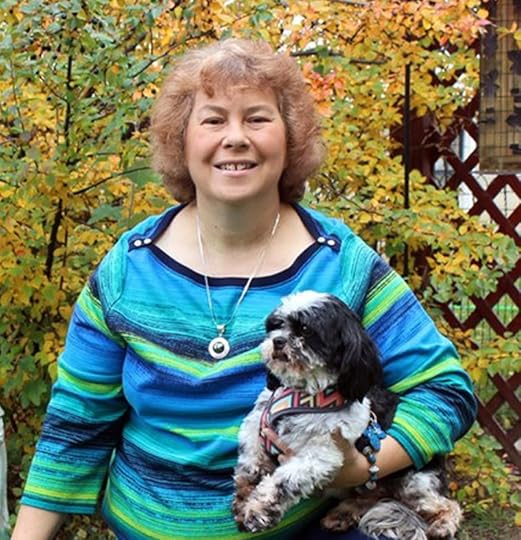Save a Life: Adopt a Puppy Mill Survivor!
 Previously named Stormy, my adopted puppy mill survivor (now christened Jeremiah) spent the first three years of his life in a puppy mill in the midwestern part of the United States. He was rescued and cared for by Hearts United for Animals, located in southeastern Nebraska.
Previously named Stormy, my adopted puppy mill survivor (now christened Jeremiah) spent the first three years of his life in a puppy mill in the midwestern part of the United States. He was rescued and cared for by Hearts United for Animals, located in southeastern Nebraska. Three years ago this month, a little Shih Tzu named Stormy found his way into my heart and home. This puppy mill survivor turns nine years old today, and if it wasn’t for a wonderful rescue organization called Hearts United for Animals, he might not have lived until his 9th birthday.
One of the missions of the organization is to shut down Midwestern puppy mills. HUA rescued Stormy (whom we renamed ‘Jeremiah’) and several other small dogs from such a facility. Other animal welfare organizations have made puppy mill dogs their focus when it comes to rescue and adoption, including National Mill Dog Rescue, based in Colorado.
Pups with a Troubled Past
We hoped Jeremiah would fit well into our family, but we knew that he might have some issues. Our puppy mill survivor had lived his first three years in appalling conditions that are unfortunately all too typical of puppy mill dogs, including confinement to tiny wire cages stacked atop each other, allowing waste to drop onto the dogs below. On the relatively rare occasions that the cages are cleaned, the dogs suffer as they are trapped as the cages are power-washed. No attention is given to socialization and little to no veterinary care is provided. Jeremiah was not neutered when he came into rescue; he served as one of the mill’s stud dogs when old enough. In this regard he was slightly more fortunate than the females, who are kept pregnant and then are killed when no longer productive.
Mill operators often sell puppies online (such as via Craigslist), through newspaper ads, and to pet stores. In fact, most animal welfare organizations, including Best Friends Animal Society, American Society for the Prevention of Cruelty to Animals (ASPCA), and the Humane Society of the United States warn against purchasing puppies and kittens from pet stores; most of the animals these businesses obtain come from unscrupulous mills (yes, even cats can suffer from such operators).
The challenges of adopting a dog with such a background can be overwhelming to the adopter. Rescues and shelters working with puppy mill survivors note that the dogs are not housetrained, many of them are timid and have significant health issues, and some may have an inability to form attachments to humans.
 Jeremiah (left) relied on our other dog, Mary, to learn how to become a loving, fun household pet. They were best friends for more than two years. Mary died from canine cancer, a major killer of dogs, in April 2019.
Jeremiah (left) relied on our other dog, Mary, to learn how to become a loving, fun household pet. They were best friends for more than two years. Mary died from canine cancer, a major killer of dogs, in April 2019.Uncertainty
After learning more about Jeremiah’s history, there was a moment of uncertainty. Yet, when I cradled him in my arms at the rescue, I knew in my heart, and pledged in my mind, we would overcome his issues (lack of confidence, not housebroken, and fear of new things). At the time, we had a springer/cocker mix named Mary – a sweet, quiet, gentle dog. From the first car ride together after Jeremiah’s adoption to the day she passed from cancer in 2019, the two dogs were inseparable.
Jeremiah took his cues from her. She helped him learn to potty outside and how to let my husband or I know he needed to go into the backyard. She helped him adjust to living in a house and enjoy sleeping on a dog bed (and the human bed!). She helped him understand people weren’t always cruel, that pats on the head and strokes on the belly were enjoyable, and that a dog could trust people and that people could and would love you and care for you.
Today
Today Jeremiah turns nine; he has spent three years in our home. He grieved for Mary for several months after she passed, but several months later, he became his own dog. Today, Jeremiah is playful. He’s a lap sitter. He loves rides in the car and walks on the leash. He enjoys exploring the woods around our cabin or the areas we visit on daytrips or longer vacations. His independence has sprung forth.
 Jeremiah has gained independence since Mary’s passing. He loves to explore the outdoors, take walks, sit on laps, and make new dog friends, especially small dogs.
Jeremiah has gained independence since Mary’s passing. He loves to explore the outdoors, take walks, sit on laps, and make new dog friends, especially small dogs.Jeremiah delights my husband and me. A protruding canine tooth creates a unique smile, and when he runs through the yard, his wispy-black ears fling backward and, like wings, help him soar through the space. His dancing antics at dinner time bring smiles to our faces, and his snuggles while lying beside us on or us stir our souls.
There are challenges when adopting a puppy mill survivor. They don’t always come out of their shell and they may not become fully house-trained, but they deserve love and care just like any other dog … or cat. Pets bring joy to people, and they depend on us for care, compassion, and companionship. I’m grateful to the people at HUA, Mill Dog Rescue, and other rescues and shelters who care enough for animals to rescue and release them from the bondage of mill operators. As I look at Jeremiah, I’m reminded of how far he has come – from confinement to freedom – and I’m so happy I get to celebrate this 9th birthday with him!
Resource
National Mill Dog Rescue has created a helpful guide for people considering adopting or fostering mill animals. View and download that resource here: https://nmdr.org/wp-content/uploads/2013/11/NMDR-From-Puppy-Mill-to-Pet.pdf
 Backyard breeders, also known as ‘millers,’ have dogs simply to produce puppies, keeping the animals in cages and constantly breeding them. Sadly, numerous puppy mills (and kitten mills) exist across the United States. These animals receive little to no socialization with people, bad nutrition, and oftentimes no medical care. Many animal welfare organizations align to help shut down these AHdeplorable operations.
Backyard breeders, also known as ‘millers,’ have dogs simply to produce puppies, keeping the animals in cages and constantly breeding them. Sadly, numerous puppy mills (and kitten mills) exist across the United States. These animals receive little to no socialization with people, bad nutrition, and oftentimes no medical care. Many animal welfare organizations align to help shut down these AHdeplorable operations.HAPPY BIRTHDAY, JEREMIAH!




